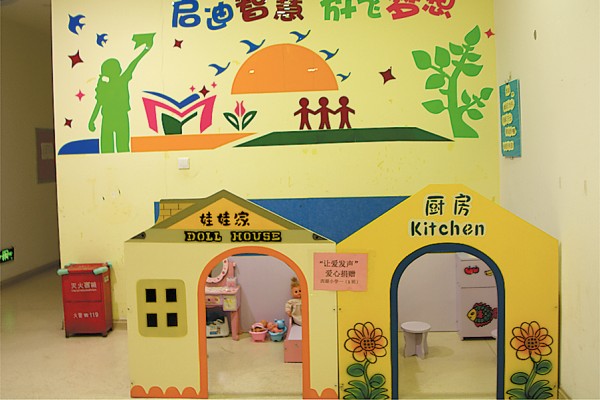
Wang plays with a hearing-impaired girl who is receiving training at her center. [Photo/China Daily]
After success with hearing-impaired son, Wang Xinan focuses on aiding others like him
Wang Xinan, who taught her hearing-impaired son the communication skills he needed to excel academically, is offering assistance to families with disabled children in Changsha, Hunan province.
Her life became more challenging soon after her son, nicknamed Chengcheng, was born in 2000.
At first, he looked and behaved just like any newborn, Wang said, gazing at the world around him with big, bright eyes and giggling when people played with him.
Twenty-two days after he was born, he was sent to the hospital to be treated for jaundice. After a 12-day stay, the baby boy seemed to have lost some of his vitality and didn't appear to respond normally to loud noises.
Wang was concerned, but her mother told her to give her son time to recover his energy.
A few months later, Wang recalled, a cup hit the ground next to Chengcheng while he slept. It didn't wake him.
In another incident that occurred during one of his naps, an iron plate fell outside, causing quite a bit of noise. Again, he remained asleep.
Wang eventually had a doctor examine Chengcheng further. When he was about a year old, he was diagnosed with severe hearing loss.
Wang was crestfallen. She remembers spending days crying and contemplating suicide.
"I didn't understand how my son had become hearing-impaired. I had undergone genetic screenings two or three times before giving birth, and there were no signs of my baby having a disability," said Wang, now 48.
"It was like doomsday. What could I do? I felt like I couldn't even breathe."

Wang Xinan poses with her son Chengcheng (left), her husband and a relative in a park in Changsha, Hunan province. [Photo/China Daily]
Fortunately, she received tremendous support from her family, who reminded her that they loved her just like she loved her little boy. They encouraged her to focus more on educating Chengcheng, who was already showing signs of intelligence and strong observational skills.
Wang decided to let go of her grief and began teaching her son to read lips when he was just 18 months old. She hoped that one day he would be able to speak and receive an education like other children.
However, she had no idea where to start, so she began by reading books at the library about how to communicate with hearing-impaired children and practiced some of the methods she learned. When she couldn't figure out how to address certain problems, she would turn to doctors for help.
It's not easy to teach any child to pronounce words, let alone one with hearing loss. But Wang didn't give up. She bought Chengcheng a hearing aid, and taught him to watch her mouth and let him touch her throat as she spoke so he could feel the vibrations.
Within two months, Chengcheng could say a few easy words like "baba" and "mama", meaning "father" and "mother" in Chinese respectively.

A decorated wall at the rehabilitation center Wang set up in 2010. [Photo/China Daily]
Gradually, Chengcheng's ability to speak and read lips improved, and he was able to attend normal schools as he got older. He received a cochlear implant in 2012 when he was in junior high school, and eight years later, his impressive academic performance earned him admission to a university.
Wang decided to use the skills she learned to help other families with children like her son. In 2003, she launched a free workshop to teach children how to speak and read lips.
It didn't take long for her to attract both students and funds. Fortunately, she was able to establish close ties with many families.
"I'm very grateful that they helped me, both financially and mentally, to continue running my workshop," she said.
In 2010, Wang set up a rehabilitation center with funds and guidance provided by social organizations and the Changsha government. The center has attracted many certified teachers and is now the largest in the city serving the disabled.
So far, 3,000 families have received help, and 1,600 children with various disabilities have attended courses at the center. Nine have been admitted to universities.
"I believe every child at the center has a bright future and will enjoy a happy life," she said.